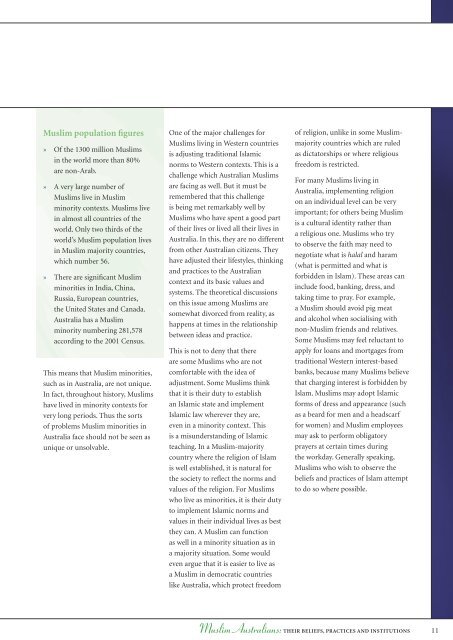Muslim Australians - Religion Cultural Diversity Resource Manual
http://www.islamicglobe.com
http://www.islamicglobe.com
Create successful ePaper yourself
Turn your PDF publications into a flip-book with our unique Google optimized e-Paper software.
<strong>Muslim</strong> population figures<br />
» Of the 1300 million <strong>Muslim</strong>s<br />
in the world more than 80%<br />
are non-Arab.<br />
» A very large number of<br />
<strong>Muslim</strong>s live in <strong>Muslim</strong><br />
minority contexts. <strong>Muslim</strong>s live<br />
in almost all countries of the<br />
world. Only two thirds of the<br />
world’s <strong>Muslim</strong> population lives<br />
in <strong>Muslim</strong> majority countries,<br />
which number 56.<br />
» There are significant <strong>Muslim</strong><br />
minorities in India, China,<br />
Russia, European countries,<br />
the United States and Canada.<br />
Australia has a <strong>Muslim</strong><br />
minority numbering 281,578<br />
according to the 2001 Census.<br />
This means that <strong>Muslim</strong> minorities,<br />
such as in Australia, are not unique.<br />
In fact, throughout history, <strong>Muslim</strong>s<br />
have lived in minority contexts for<br />
very long periods. Thus the sorts<br />
of problems <strong>Muslim</strong> minorities in<br />
Australia face should not be seen as<br />
unique or unsolvable.<br />
One of the major challenges for<br />
<strong>Muslim</strong>s living in Western countries<br />
is adjusting traditional Islamic<br />
norms to Western contexts. This is a<br />
challenge which Australian <strong>Muslim</strong>s<br />
are facing as well. But it must be<br />
remembered that this challenge<br />
is being met remarkably well by<br />
<strong>Muslim</strong>s who have spent a good part<br />
of their lives or lived all their lives in<br />
Australia. In this, they are no different<br />
from other Australian citizens. They<br />
have adjusted their lifestyles, thinking<br />
and practices to the Australian<br />
context and its basic values and<br />
systems. The theoretical discussions<br />
on this issue among <strong>Muslim</strong>s are<br />
somewhat divorced from reality, as<br />
happens at times in the relationship<br />
between ideas and practice.<br />
This is not to deny that there<br />
are some <strong>Muslim</strong>s who are not<br />
comfortable with the idea of<br />
adjustment. Some <strong>Muslim</strong>s think<br />
that it is their duty to establish<br />
an Islamic state and implement<br />
Islamic law wherever they are,<br />
even in a minority context. This<br />
is a misunderstanding of Islamic<br />
teaching. In a <strong>Muslim</strong>-majority<br />
country where the religion of Islam<br />
is well established, it is natural for<br />
the society to reflect the norms and<br />
values of the religion. For <strong>Muslim</strong>s<br />
who live as minorities, it is their duty<br />
to implement Islamic norms and<br />
values in their individual lives as best<br />
they can. A <strong>Muslim</strong> can function<br />
as well in a minority situation as in<br />
a majority situation. Some would<br />
even argue that it is easier to live as<br />
a <strong>Muslim</strong> in democratic countries<br />
like Australia, which protect freedom<br />
of religion, unlike in some <strong>Muslim</strong>majority<br />
countries which are ruled<br />
as dictatorships or where religious<br />
freedom is restricted.<br />
For many <strong>Muslim</strong>s living in<br />
Australia, implementing religion<br />
on an individual level can be very<br />
important; for others being <strong>Muslim</strong><br />
is a cultural identity rather than<br />
a religious one. <strong>Muslim</strong>s who try<br />
to observe the faith may need to<br />
negotiate what is halal and haram<br />
(what is permitted and what is<br />
forbidden in Islam). These areas can<br />
include food, banking, dress, and<br />
taking time to pray. For example,<br />
a <strong>Muslim</strong> should avoid pig meat<br />
and alcohol when socialising with<br />
non-<strong>Muslim</strong> friends and relatives.<br />
Some <strong>Muslim</strong>s may feel reluctant to<br />
apply for loans and mortgages from<br />
traditional Western interest-based<br />
banks, because many <strong>Muslim</strong>s believe<br />
that charging interest is forbidden by<br />
Islam. <strong>Muslim</strong>s may adopt Islamic<br />
forms of dress and appearance (such<br />
as a beard for men and a headscarf<br />
for women) and <strong>Muslim</strong> employees<br />
may ask to perform obligatory<br />
prayers at certain times during<br />
the workday. Generally speaking,<br />
<strong>Muslim</strong>s who wish to observe the<br />
beliefs and practices of Islam attempt<br />
to do so where possible.<br />
<strong>Muslim</strong> <strong>Australians</strong>:THEIR BELIEFS, PRACTICES AND INSTITUTIONS 11














